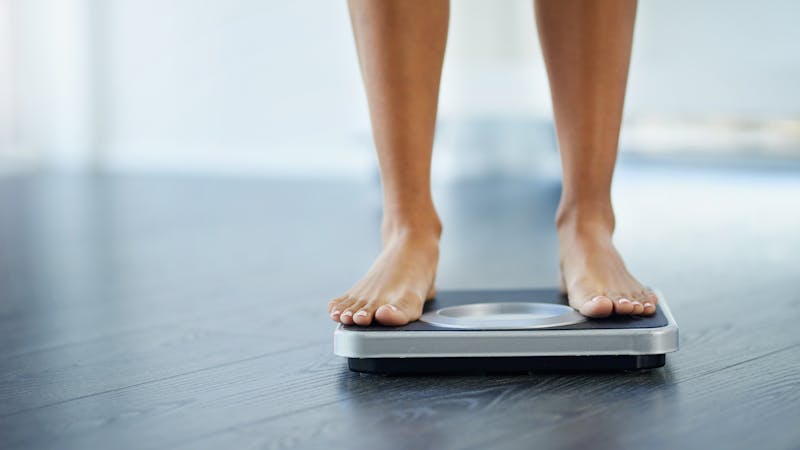Weight gain and menopause: 8 tips to win the battle of the middle-age bulge
Maybe you’ve been dieting and exercising but the pounds are stubbornly hanging on?
We’re here to help.
This guide tells you what you need to know about menopause, plus how to manage (and potentially lose) weight during the menopause transition. In short, a low carb diet and certain lifestyle changes can greatly help.
Millions of women around the globe are currently going through “the change.” When looking at the years lived after age 60 — called postmenopause — it’s estimated that close to 1 billion women in the world today are going through menopause or are postmenopausal.1
Given that most women spend one-third of their lives in this non-reproductive state, it helps to understand what is going on with your metabolism and hormones.
What changes can you make that will help prevent or even reverse any menopausal weight gain? How can you best protect your health?
Here are our top 8 tips:
- Eat a low carb or ketogenic diet. This can help keep insulin low, which may help reduce abdominal fat gain.
- Eat enough protein. This helps maintain lean muscle mass and decrease hunger.
- Lift weights or do resistance training. This also helps maintain and build more muscle.
- Introduce time-restricted eating, such as skipping breakfast. This helps keep insulin low for longer stretches and may be an easy way to decrease caloric intake.
- Avoid excess consumption, especially snacks, nuts, and alcohol.
- Prioritize sleep. This can decrease cortisol and reduce insulin resistance.
- Manage stress with relaxation techniques. Yoga, exercise, and meditation can all help.
- Talk with your doctor about a trial of hormone replacement therapy (HRT) if you are having a very difficult menopause transition. While HRT is associated with only a small decrease or no change in weight, it may specifically help with fat accumulation around the middle.
For more details about what happens during menopause and why these eight tips can help, read on.
First, what is menopause?
Menopause marks the end of a woman’s menstrual cycles. It is defined as a full 12 months without a menstrual period for women over the age of 40.2 While the average age of onset in North America is around 52, the hormonal changes can start in a woman’s early 40s and last into her 60s.3
Research shows that the timing of menopause is a complex mix of genetics, ethnicity, geography, socio-economic status, and lifestyle factors.4
The symptoms of menopause are well known: hot flashes, night sweats, mood changes, brain fog, headache, disrupted sleep, vaginal dryness, bloating, and more. Unfortunately, weight gain and increased body fat, especially around the abdomen, are very common complaints.5
It’s estimated that most women, without changing anything in their diet or lifestyle, gain an average of 2 to 5 pounds during the menopausal transition. However, some gain much more than this.6
Hormonal changes
Why do these symptoms and weight gain occur? You can blame your hormones for much of it.
Estrogen and progesterone — a woman’s reproductive hormones — change dramatically at menopause.7 The change in estrogen is the one thought to be related to most of the symptoms of menopause. Secreted from the follicles of a woman’s ovaries and called estradiol, or E2, it declines because the follicles have been depleted.
The decline of estrogen can be erratic.8 About one-third of women first experience a sharp rise in E2 in their mid-40s (called perimenopause) and then a sharp decline. Others just have a steady, slow decline. But by the time of the last menstrual period, all women have experienced a large decrease in estrogen levels.9
During menopause, some women will also experience a significant increase in the secretion of the stress hormone cortisol, especially during the night.10 There is very weak evidence suggesting that this may contribute to increased hunger and weight gain, especially around the middle.11
Why cortisol secretion sometimes increases during menopause is not completely understood. It appears more likely to be related to internal physiologic changes, as opposed to a response to social stressors, but the data are inconclusive.12
In summary, the hormonal changes seen during menopause have the potential to cause numerous symptoms, in addition to negatively affecting a woman’s body composition.
The weight-loss challenge of menopause
Losing weight can be hard for anyone. Do menopausal women have an especially tough time?
While most women believe it’s definitely more difficult for them to lose weight during “the change,” among researchers it is a bit controversial whether or not menopausal women face unique weight-loss challenges.
Some studies have suggested that women’s weight gain in midlife is simply a factor of aging — which impacts both sexes — more than menopausal changes in hormones.13
While mouse studies show that inducing low estrogen levels by removing the ovaries causes a decrease in energy expenditure, human studies of premature ovarian failure have not shown weight gain; in fact, these women tend to be leaner.14
Most research in the field of menopause recognizes that the trajectory of weight gain seen in mid-life doesn’t usually change during the menopause transition. Rather, it’s the body composition — with greater accumulation of body fat — that tends to change the most.
Physical and metabolic changes during menopause include:
Loss of muscle mass, increased body fat
At the start of the menopause transition, a woman’s rate of fat gain doubles and her lean muscle mass declines. This phenomenon, researchers say, is related to hormonal changes of menopause and not simply age. It lasts until about two years after the final menstrual period and then stabilizes.15
Sarcopenic obesity
Loss of muscle mass and reduced muscle strength combined with increased fat has a specific name: sarcopenic obesity. This is a new field of study, with a number of challenges regarding definitions and consistent research approaches.
However, there is emerging consensus that sarcopenic obesity is associated with a number of health problems, including weakness and falls, reduced mobility, diabetes, cardiovascular disease and higher rates of death from all causes.16
Insulin resistance
Insulin resistance can develop for a number of reasons. In menopause, specifically, it may increase due to declining estrogen, increased abdominal fat, aging, and of course genetic factors.17
As insulin resistance increases, the pancreas works harder to produce more insulin in an effort to keep blood sugar levels normal. Higher insulin levels promote the storage of fat, keeping it locked up and harder to burn as fuel.18
Metabolic syndrome
When a collection of concerning health measurements and biomarkers are found together — insulin resistance, obesity, high blood pressure, and lipid problems — this is called metabolic syndrome. Having these risk factors puts people at higher risk of cardiovascular disease and diabetes.
Unfortunately, menopause increases the risk of developing metabolic syndrome.19
Metabolic syndrome in women is present if three or more of the following five criteria are met: waist circumference over 35 inches, blood pressure over 130/85 mmHg, fasting triglyceride (TG) level over 150 mg/dl, fasting high-density lipoprotein (HDL) cholesterol level less than 50 mg/dl and fasting blood sugar over 100 mg/dl.20
Resting energy expenditure
The loss of muscle mass and the increase in body fat create another problem: a woman’s resting energy expenditure (the speed of her metabolism) may go down. This can happen to anyone with advancing age if boay fat increases, but it is possible that a dramatic menopause-induced change in body composition could make it worse.21
8 top tips for managing weight at menopause
Has reading this far made you depressed and discouraged? Don’t be. While you cannot prevent menopause, you can prevent some of its negative health impacts through diet and lifestyle changes.
Remember, however, good health is more than simply a number on the scale. As we have noted in other places on our site, you do not have complete control over how much weight you lose, how fast you lose it, and what body parts you lose it from. Managing these expectations is part of long-term success. Make sure you read our guide on setting expectations.

Setting realistic expectations
GuideHow long does it take to lose weight? How much weight can you lose? We explain what you can and can’t control about your weight loss journey loss.
Many of these steps will improve body composition, keeping fat gain to a minimum. They may even help you lose body fat.
Each subsection below links to our more in-depth guides, which you can explore for further details.
1. Eat a low carb diet
The carbohydrates you eat digest to glucose, which raises insulin. To reduce insulin levels and possibly reverse insulin resistance, simply cut out sugar and high carb foods like rice, potatoes, bread, pasta, and baked goods that rapidly convert to sugar. Keeping insulin low may allow your body to more easily access fat stores to burn for energy.22
Low carb diets might even increase metabolism – potentially increasing fat burning – by between 200 and 500 calories per day.23
How low you go is up to you; even cutting out sugary drinks and added sugar can be a first positive step. Our guides will tell you how.- Why low carb can help you lose weight
- A low carb diet for beginners
- A ketogenic diet for beginners
- Eating better: Six steps down the carb mountain
2. Eat enough protein
Getting enough protein at every meal maintains lean muscle mass and helps counteract the muscle loss of aging and the increase of sarcopenic obesity. Critically, it is also the most satiating macronutrient, meaning that eating protein is the best way to turn off your brain’s desire to eat.24 A 2022 paper found that because of the hormonal loss of lean muscle during menopause, women are driven to consume more calories in attempts to replace lost protein, a process also known as “protein leverage.” 25 An excellent blog by nutritional coach Marty Kendall explains this phenomenon of the body seeking to meet higher protein needs in more detail.
Simply adding an egg to a meal will increase your protein.
Our protein guides give lots of other tips for how to add protein and how to calculate how much you need.
- How much protein should you eat?
- Protein on a low carb or keto diet: the complete guide
- Target protein tables
Menopause meal plans
To help you achieve your goals, we’ve developed a meal plan specifically for women suffering from menopause symptoms. Each day you’ll enjoy high protein, keto, and low carb dishes, providing under 20 grams of net carbs per day.
3. Lift weights or do bodyweight resistance training
You’ve heard the phrase “use it or lose it?” Well, this applies to your muscles. Muscles that aren’t used become weak and flabby. Even simple bodyweight exercises like squats and knee-pushups help maintain and build more muscle.
More muscle not only makes you stronger (and strengthens your bones, too), it can help you maintain resting energy expenditure, improve blood sugar, and reduce insulin resistance.26
- Exercise and health: A guide for what type of exercise is best for you
- Three at-home workout plans
- Let’s get moving: Exercise course for beginners
- Video: Ketogenic diets and resistance training
4. Introduce time-restricted eating
If you are not eating as often, you will tend to consume fewer calories overall, plus insulin levels remain low for longer. It can be as simple as skipping breakfast. And when you are eating a low carb diet, skipping a meal is often easier to do.27 Time-restricted eating is just one type of intermittent fasting that may help burn body fat stores and improve certain health biomarkers.28 Other types of intermittent fasting include eating just one meal a day, or OMAD.
- Time-restricted eating: a detailed intermittent fasting guide
- Intermittent fasting for beginners
- What you need to know about OMAD
- All intermittent fasting guides
5. Avoid excess consumption, especially snacks, nuts, alcohol and keto treats
When metabolism slows during menopause, even consuming slightly more than you need can add to weight struggles. While a low carb diet can help you keep consumption in check by reducing cravings and increasing satiety between meals, you can still go overboard on keto-approved foods.29
Paying attention to food and drinks that contain little nutrition and/or lots of calories is important for women in menopause. That means be careful with keto desserts, fat bombs, bulletproof coffee, MCT oil, alcohol, low carb fruits, and nuts. If you’re really struggling, try replacing full-fat dairy like cheese and Greek yogurt with lower fat versions.
Understanding hunger signals helps control excess consumption, too.
- Keto and low carb dairy: the best and the worst
- Low carb alcohol: the best and the worst drinks
- Guide: 7 things you need to know about alcohol and the keto diet
- How to manage hunger when trying to lose weight
- Is it hunger? Or is that pang a need for something else?
- Low carb nuts – the best and the worst
- Keto snacks- the best and the worst
- Keto sweeteners guide
6. Prioritize sleep
Like a poor diet, successive nights of bad sleep are also bad for your health and can lead to weight gain.30
Consistently good sleep, however, may help decrease cortisol and reduce insulin resistance, making weight management easier.31
If menopause is making you lose sleep at night, try the tips for good sleep hygiene: have a cool, quiet room; create a relaxing sleep routine; reduce stimulants and alcohol; and turn off screens at least an hour before bed.
7. Manage stress with relaxation techniques
Diet, sleep, and exercise are not the only things that influence weight. Daytime stress and life-stress can raise cortisol, possibly making it harder to drop those excess pounds.32 Though it’s hard to prove, we believe that yoga, relaxing exercise like Tai Chi, meditation, and relaxing hobbies can all help.
8. Try HRT
Some women have such severe symptoms during menopause that taking hormone replacement therapy helps them sleep, deal with hot flashes, and better manage the weight and body composition changes.33 Talk with your doctor about a trial of HRT if you are having a very difficult menopause transition.
Summary
No question about it: Hormonally, things change for a woman during the menopause transition. Not only does this come with many uncomfortable symptoms, it changes a woman’s health risks and body composition. These changes include increased abdominal obesity, insulin resistance, muscle loss, and difficulty losing weight.
But you are not alone – millions of women are dealing with the same issues. And with the adoption of a low carb diet, as well as a few other lifestyle tweaks, you can still have good health and vitality, reaching the right weight for you, in menopause and beyond.
Weight gain and menopause: 8 tips to win the battle of the middle-age bulge - the evidence
This guide is written by Anne Mullens and was last updated on June 19, 2025. It was medically reviewed by Dr. Michael Tamber, MD on May 26, 2021.
The guide contains scientific references. You can find these in the notes throughout the text, and click the links to read the peer-reviewed scientific papers. When appropriate we include a grading of the strength of the evidence, with a link to our policy on this. Our evidence-based guides are updated at least once per year to reflect and reference the latest science on the topic.
All our evidence-based health guides are written or reviewed by medical doctors who are experts on the topic. To stay unbiased we show no ads, sell no physical products, and take no money from the industry. We're fully funded by the people, via an optional membership. Most information at Diet Doctor is free forever.
Read more about our policies and work with evidence-based guides, nutritional controversies, our editorial team, and our medical review board.
Should you find any inaccuracy in this guide, please email andreas@dietdoctor.com.
By the year 2025, the number of postmenopausal women is expected to rise to 1.1 billion worldwide:
Menopause 2014: The North American Menopause Society Recommendations for Clinical Care of Midlife Women [expert review, ungraded] ↩
Menstruation that stops in younger women is called amenorrhea and should be investigated. ↩
Obstetric and Gynecology Clinics of North America 2011: The Timing of the Age at Which Natural Menopause Occurs
[Expert review, ungraded]Human Reproduction 2019: Variations in reproductive events across life: a pooled analysis of data from 505 147 women across 10 countries. [pooled cohort studies, weak evidence]
↩Endocrinology and Metabolism Clinics of North America 2015: Menopause symptoms and their management [Expert review, ungraded] ↩
Journal of Women’s Health 1998: The influence of sex hormones on obesity across the female life span [overview article; ungraded] ↩
Menopause 2019: The menopause transition and women’s health at midlife: a progress report from the Study of Women’s Health Across the Nation (SWAN) [longitudinal cohort study, weak evidence] ↩
Journal of Clinical Endocrinology and Metabolism 1996: Characterization of reproductive hormonal dynamics in the perimenopause[non-controlled study; weak evidence] ↩
Menopause 2019: The menopause transition and women’s health at midlife: a progress report from the Study of Women’s Health Across the Nation (SWAN) [longitudinal cohort study, weak evidence]
↩Menopause 2009: Cortisol levels during the menopausal transition and early postmenopause: Observations from the Seattle Midlife Women’s Health Study. [longitudinal cohort study, weak evidence] ↩
Obesity (Silver Spring) 2017: Stress, cortisol, and other appetite-related hormones: Prospective prediction of 6-month changes in food cravings and weight [observational study; very weak evidence] ↩
Menopause 2009: Cortisol levels during the menopausal transition and early postmenopause: Observations from the Seattle Midlife Women’s Health Study. [longitudinal cohort study, weak evidence] ↩
This meta-analysis notes that, while weight gain itself may be due mostly to aging, abdominal fat mass accumulation may be caused or exacerbated by hormonal changes:
American Journal of Obstetrics and Gynecology 2019: Fat mass changes during menopause: a meta-analysis [meta-analysis of observational studies; weak evidence] ↩
Climacteric 2012: Understanding weight gain at menopause [review of animal and human studies; ungraded] ↩
Journal of Clinical Insight 2019: Changes in body composition and weight during the menopause transition [observational study, weak evidence] ↩
Frontiers of Endocrinology 2020: Health consequences of sarcopenic obesity: a narrative review [Expert review, ungraded] ↩
Clinical Science 1992: Ageing and the Response of Plasma Insulin, Glucose and C-peptide Concentrations to Intravenous Glucose in Postmenopausal Women [non-controlled study, weak evidence] ↩
Clinical Biochemist Reviews 2005: Insulin and insulin resistance [overview article; ungraded] ↩
Climacteric 2017: Metabolic syndrome in menopause and associated factors: a meta-analysis [meta-analysis of observational studies, weak evidence] ↩
Disease Models & Mechanisms 2009: A comprehensive definition for metabolic syndrome [Expert review, ungraded] ↩
International Journal of Obesity 2008: Increased visceral fat and decreased energy expenditure during the menopausal transition [observational longitudinal study, very weak evidence] ↩
Numerous RCTs and meta-analyses have shown that low carb diets are equivalent to or very often better than low fat diets for weight loss:
International Journal of Endocrinology 2021: Comparing the efficacy and safety of low carbohydrate diets with low fat diets for type 2 diabetes mellitus patients: a systematic review and meta-analysis of randomized clinical trials [strong evidence]
This review emphasizes the point that low carb diets tend to lead to decreased calorie intake, even when people are allowed to eat as much as they want:
Journal of Nutritional Science 2021: Restricting carbohydrates and calories in the treatment of type 2 diabetes: a systematic review of the effectiveness of ‘low carbohydrate’ interventions with differing energy levels [strong evidence]
Current Diabetes Reports 2021: Efficacy of ketogenic diets on type 2 diabetes: a systematic review [strong evidence]
Nutrients 2020: The effect of low fat and low carbohydrate diets on weight loss and lipid levels: a systematic review and meta-analysis [strong evidence]
Nutrients 2020: Impact of a ketogenic diet on metabolic parameters in patients with obesity or overweight and with or without type 2 diabetes: a meta-analysis of randomized controlled trials [strong evidence]
The British Journal of Nutrition 2016: Effects of low carbohydrate diets v. low fat diets on body weight and cardiovascular risk factors: a meta-analysis of randomised controlled trials [strong evidence] Learn more
PLOS ONE 2015: Dietary intervention for overweight and obese adults: comparison of low carbohydrate and low fat diets. A meta-analysis [strong evidence] ↩
British Medical Journal 2018: Effects of a low carbohydrate diet on energy expenditure during weight loss maintenance: randomized trial [moderate evidence] ↩
NRC Research Press: Protein: A nutrient in focus [overview article; ungraded]
Nutrients 2016: Protein consumption and the elderly: What is the optimal level of intake? [overview article; ungraded]
↩International Journal of Obstetrics and Gynecology 2022: Weight gain during the menopause transition: Evidence for a mechanism dependent on protein leverage [overview article; ungraded] ↩
Resistance training and high-intensity interval training (HIIT) may be especially beneficial for improving body composition and metabolic rate:
Journal of Applied Physiology 2012: Effects of aerobic and/or resistance training on body mass and fat mass in overweight or obese adults [randomized trial; moderate evidence]
British Journal of Sports Medicine 2017: Effects of high-intensity interval training on cardiometabolic health: a systematic review and meta-analysis of intervention studies [systematic review of randomized trials; strong evidence]
Journal of Obesity 2012: The effect of high-intensity intermittent exercise on body composition of overweight young males [randomized trial;moderate evidence]
↩This is based on clinical experience of low carb practitioners and was unanimously agreed upon by our low carb expert panel. You can learn more about our panel here [weak evidence]. ↩
Cell Metabolism 2019: Ten-hour time-restricted eating reduces weight, blood pressure, and atherogenic lipids in patients with metabolic syndrome [non-controlled study; weak evidence]
American Journal of Clinical Nutrition 2009: A controlled trial of reduced meal frequency without caloric restriction in healthy, normal-weight, middle-aged adults
[randomized trial; moderate evidence]
↩Obesity Reviews 2014: Do ketogenic diets really suppress appetite? A systematic review and meta-analysis [strong evidence]
Obesity 2007: The effects of a low carbohydrate ketogenic diet and a low fat diet on mood, hunger, and other self-reported symptoms [moderate evidence] ↩
Physiology & Behavior 2018: Effect of sleep curtailment on dietary behavior and physical activity: a randomized crossover trial [moderate evidence]
Nutrients 2019: Increased hunger, food cravings, food reward, and portion size selection after sleep curtailment in women without obesity [randomized trial; moderate evidence] ↩
Sleep 2017: Sleep Characteristics and Daytime Cortisol Levels in Older Adults [cohort study; weak evidence]
Metabolism 2018: Sleep influences on obesity, insulin resistance, and risk of type 2 diabetes[overview article; ungraded]
Clinical Endocrinology 2003: Obstructive sleep apnoea syndrome impairs insulin sensitivity independently of anthropometric variables [cohort study; weak evidence]
European Respiratory Journal 2010: A randomized controlled trial of nasal continuous positive airway pressure on insulin sensitivity in obstructive sleep apnoea [moderate evidence]
↩Obesity (Silver Spring) 2017: Stress, cortisol, and other appetite-related hormones: Prospective prediction of 6-month changes in food cravings and weight [observational study; very weak evidence] ↩
Research has shown either a small effect or no effect of hormone therapy on the loss of fat and preservation of muscle.
American Journal of Clinical Nutrition 2005: Postmenopausal hormone therapy and body composition–a substudy of the estrogen plus progestin trial of the Women’s Health Initiative[randomized trial; moderate evidence]
Cochrane Database of Systematic Reviews 2000: Oestrogen and progestogen hormone replacement therapy for peri-menopausal and post-menopausal women: weight and body fat distribution [meta-analysis of randomized trials; strong evidence] ↩




